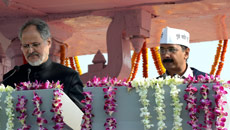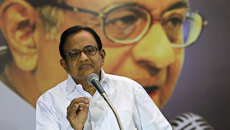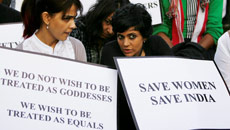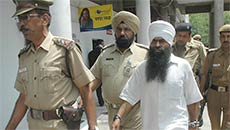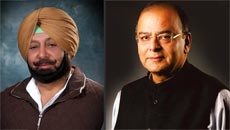Why has the Bharatiya Janata Party (BJP) not been able to release the party manifesto as yet, even though the first phase of balloting begins Monday? For Narendra Modi, this lapse is a major embarrassment. Not only does it point to a cloudiness of the outlook which is holding up its release but also that the "one man show", which is how the party's "mentor", L.K. Advani, described Modi's command-and-control structure, does have a few cracks.
The conjecture is that the manifesto has become a victim of the tug-of-war between Modi's development plank and the BJP old guard's Hindutva agenda which has the support of the Rashtriya Swayamsevak Sangh (RSS), the head of the saffron brotherhood.
The BJP's prime ministerial candidate appears to have already bowed to the dictates of the old guard and the RSS by slamming the Congress for allowing beef exports. He did so at a meeting in an area dominated by Yadavs, who belong to the intermediate caste which has traditionally been associated with the rearing of cattle as goalas or milkmen.
But it isn't their supposed sensitivities which guided Modi, but the long-standing propaganda of the RSS castigating Muslims as beef-eaters who have scant regard for the veneration of the Hindus for the cow.
Similarly, Modi is believed to have acceded to the party's pro-Bania (tradesmen) sentiments by opposing foreign investment in the retail sector although he advised the small shopowners not long ago to be prepared to face the global challenge. However, these may not be the only issues which have held up the release of the manifesto.
It is possible that the old guard and the RSS are keen on reversing the process initiated by Atal Bihari Vajpayee in 1996 when he put on hold the three key points of the Hindutva agenda - the building of the Ram temple in Ayodhya, the scrapping of article 370 of the constitution conferring special status on Kashmir, and introducing a uniform civil code which will dispense with the so-called personal laws of various communities relating to marriage, inheritance et al.
Vajpayee's decision followed his failure to form a government because none of the "secular" parties was willing to join it despite trying for 13 days. It was after the three points were shelved that he was able to come to power at the head of an unprecedented 24-party coalition in 1998 when the BJP won 182 seats.

As is known, the RSS and the BJP hardliners have never been happy with this backsliding by the "moderate" Vajpayee, who was derided as "half a Congressman" by the Hindutva hawk, Sadhvi Rithambara.
It is not impossible that Modi's rising star has persuaded the hardliners to restore the deleted items in the BJP's programme. Modi may not be opposed to the idea. After all, as an old pracharak (preacher), his instincts must endorse the preferences of the RSS.
At the same time, he cannot be sure how a return to what the Sangh Parivar propagated during the Ramjanmabhoomi movement in the 1990s will play out two decades later, especially when he likes to project himself as a business-friendly "vikas purush" or development man focussed on bullet trains and "smart" cities.
Nor can he be certain as to how his admirers in the corporate sector will react to a pledge to build the temple, amend the Constitution on a sensitive subject like Kashmir and change "personal" laws which will affect the centuries-old traditions of Hindus, Muslims, Christians, Parsis and others.
For instance, one such "law" which will be nullified is the tradition of Hindu brides and grooms to be married with agni or fire as a "witness" to the chanting of mantras. If a uniform code is introduced, only "civil" marriages certified by a registered officer will be legal.
It is obvious that an overturning of Vajpayee's promise of 1996 will lead to social tremors and communal tension by rekindling fears that the bad, old days are back. Neither the corporate sector, which prefers a stable atmosphere, nor the common man will be pleased.
It is not inconsequential that the head of the drafting committee is Murli Manohar Joshi, who was known for initiating the process of the saffronization of textbooks when he was the human resource development minister in Vajpayee's cabinet.
More recently, he was turfed out of his old constituency of Varanasi to accommodate Modi. It may not be entirely fanciful, therefore, to suggest that he is trying to get his own back on the man who humiliated him by loading the manifesto with his own antediluvian ideas.

Ironically, manifestos have rarely aroused much interest among the general public. They are usually seen as statements of intent which the parties issue as a matter of routine with no wish to implement them.
In the BJP's case, however, it isn't only the unusual delay which is significant because its publication April 7, when the Lok Sabha election would have started, has been frowned upon by the Election Commission, but because the internal reasons point to a deeply divided party.


